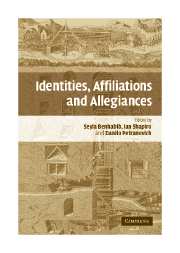Book contents
- Frontmatter
- Contents
- List of figures
- List of tables
- List of contributors
- Editors' introduction
- Part I Emergence and limits of national political identities
- Part II Multiple identities in practice: the European example
- Part III Decoupling citizenship from identity
- 8 Binding problems, boundary problems: the trouble with “democratic citizenship”
- 9 Immigrant political integration and ethnic civic communities in Amsterdam
- 10 Nonterritorial boundaries of citizenship
- 11 Against birthright privilege: redefining citizenship as property
- Part IV Identity and historical injustice
- References
- Index
10 - Nonterritorial boundaries of citizenship
Published online by Cambridge University Press: 05 June 2012
- Frontmatter
- Contents
- List of figures
- List of tables
- List of contributors
- Editors' introduction
- Part I Emergence and limits of national political identities
- Part II Multiple identities in practice: the European example
- Part III Decoupling citizenship from identity
- 8 Binding problems, boundary problems: the trouble with “democratic citizenship”
- 9 Immigrant political integration and ethnic civic communities in Amsterdam
- 10 Nonterritorial boundaries of citizenship
- 11 Against birthright privilege: redefining citizenship as property
- Part IV Identity and historical injustice
- References
- Index
Summary
Introduction
Discourses of loyalty, patriotism, and national identity have always been familiar fixtures of American public discourse. But after 9/11, patriotic sentiments were expressed more unreservedly than in recent memory, perhaps more so than in any period since the early Cold War. This is unsurprising, given the devastation wrought by the terrorist attacks and the fact that a violent assault by a foreign enemy is always a spur to national solidarity. Some have expressed the hope that this resurgence of patriotism will have a reinvigorating effect on American democracy. The September Project, for example, aims to draw citizens into discussions on the meaning of democracy in public libraries across the country on Patriot Day – the name given by Congress and President Bush to September 11. Scheduled events include public readings of the Bill of Rights and the Declaration of Independence, discussions of “what works” and “what doesn't work” in American democracy, and, in many places, voter registration drives. Meanwhile, others worry that the resurgence of patriotic feeling will fade away all too quickly. In his latest provocation to defenders of cultural diversity, for example, Samuel Huntington laments that the post-9/11 spark of patriotism will soon be extinguished by the vast tide of Mexican immigration. Hispanics, he argues, too often fail to assimilate to the Anglo-Protestant American political culture that underwrites American democracy, thus joining other forces that weaken American identity and the citizenship it enables (Huntington 2004a, esp. chapter 9).
- Type
- Chapter
- Information
- Identities, Affiliations, and Allegiances , pp. 226 - 256Publisher: Cambridge University PressPrint publication year: 2007
- 14
- Cited by



